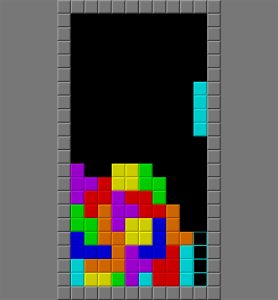Video games can also be used far away from physical aches and pains, namely in psychotherapy. For example, it has already been shown that children not only find minor medical interventions such as vaccinations or blood tests less painful if they are allowed to gamble, but also feel less afraid of them at the same time. Other psychological symptoms such as stress and depressive moods can also be significantly alleviated with just a 30-minute play session – and by no means only in children.
Tetris against trauma
Interestingly enough, games that one would not normally have associated with mental problems are also suitable for treating mental problems. An example of this is the Nintendo classic “Tetris”, in which players have to rotate and move falling shapes in order to make rows with them without gaps. The decades-old, simple game has now found its way into trauma therapy.
Because Tetris has been proven to help reduce so-called flashbacks, “flashes of memories” in which the person involuntarily relives the traumatic event. This effect can be created in two ways: either by having the affected person play Tetris within 24 hours of the traumatic situation, or by writing down the distressing memories some time later and then starting to play the game.
Christiane Eichenberg from the Sigmund Freud Private University in Berlin provides a possible explanation for this effect: “When those affected imagine detailed images of the stressful memory, the areas in the brain for spatial-image processing are activated, with comparable areas also being used for playing games Tetris could be significant, so there is interference.” That interference then, over time, dilutes the traumatic memory trace like a noise signal, reducing associated flashbacks.
A fantasy world that cures depression
While Tetris isn’t specifically designed for trauma therapy, there are psychological health games that do just that. Perhaps the most prominent example here is the fantasy role-playing game Sparx, which has been shown to be extremely useful in the treatment of depression.
In Sparx, players create their own avatar and use it to restore balance to the fantasy world by finding and dismantling negative thoughts known as GNATs. The game is aimed at young people between the ages of twelve and 19 and is designed as a playful self-help program in which the players learn relaxation exercises, train their social skills or find out what to do in the event of a depressive relapse.
Sparx teaches teenagers strategies to deal with depression in a fantasy world. © SPARX
In a study of 187 young gamers, the game proved to be extremely effective and equal, if not superior to, conventional therapy. 44 percent of teens who played Sparx recovered from their depressive symptoms. For those who received traditional therapy instead, it was only 26 percent.
So the notion that video games are just a pointless pastime that dulls the youth is long gone.

